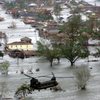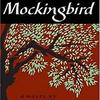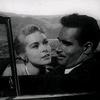John Hockenberry appears in the following:
Lingering Questions about the Oil Spill
Monday, September 20, 2010


So after months of hyperbole and the worst kind of gloom and doom from everyone associated with the BP oil spill in the Gulf of Mexico, it's suddenly over.
Down Syndrome in My Family
Monday, September 20, 2010


This July a joyous event took place at our home. A family reunion of my wife’s siblings, cousins and aunts and uncles all gathered together in rural Massachusetts. We never see this gang all together. There was a fabulous wedding down in Costa Rica a few years back and everyone had quite an adventure on Tamarindo beach. There have been other occasional affairs but with schedules what they are and people living far apart (one cousin has a wife in China who is waiting for a U.S. visa but that’s another story) and different family arrangements all around getting a family reunion scheduled is a big challenge. I’ve given up trying for my side of the family. But there is one thing that binds us together. This year’s reunion was all about celebrating the 45th birthday of Lisa Blatz the oldest child in my wife’s uncle’s family. Don’t worry about the details. Lisa was born with Down’s syndrome 45 years ago. It was a shock to the family that I will not even begin to characterize because 45 years later Lisa is the glue for this entire family. If she calls a birthday party everyone shows up. She keeps track of everyone. She remembers everyone’s birthday. During last summer’s birthday party/reunion there were few dry eyes. When people weren’t sobbing with gratitude over what Lisa has brought to the family they were just busy having fun and enjoying everyone’s company.
Castles Made of Sand: Remembering Jimi Hendrix
Friday, September 17, 2010


40 years since the death of Jimi Hendrix. It’s really astounding to imagine that he’s been gone that long. It’s not surprising that Hendrix’s music lives on. Hendrix created the whole Fender Stratocaster power chord distortion mystique for the electric guitar. He made magic. He mesmerized audiences. He died young. His narrative is the allegory of the mid 20th century where a curtain came down hard on a show that seemed to be just getting started.
Northern Cities, Shaped by the Great Migration
Wednesday, September 15, 2010


The great migration is not a part of my family experience. Our white ancestors landed in the Northeast, one of my relatives on my mother’s side was one of the first Dutch settlers in New York, and they stayed in the Northeast. After the original migration from places in Europe my gang stayed put.
The Language of Language
Wednesday, September 08, 2010


The blues are blue and when you get the blues you feel blue but listening to Blind Lemon
Jefferson does not immediately inspire a trip to the Cote ‘d’Azur. The ideas of blue for English speakers, for American English speakers, for French and Spanish speakers are certainly all different.
But what about the color blue? Is the blue sky over Nice and Barcelona the same color as the smoky azure in some Southside Chicago blues bar?
It’s impossible to know what happens inside the brain in this way but thinking about how brains are changed by the languages their owners speak. Got me thinking about how isolated I’ve always felt as a mono-lingual English speaking American who has a smattering of Latin, German and Spanish lying dormant inside his skull.
When I First Met Spock
Friday, September 03, 2010


Back in high school when I was utterly clueless about what I might do for a living I thought about being an actor. I had done numerous plays in the local community theatre in Western Michigan, where I went to high school. I was the lead in our high school musical. I played a Greek guy, Zorba the Greek, in fact, in the Kander and Ebb show, "Zorba." The opening song from that show was “Life is…” The first line, “Life is what you do while you’re waiting to die,” is a compelling, if questionable concept for a kid in high school thinking about what he might do when he grows up.
On Parenting and Andre Agassi
Thursday, September 02, 2010


Andre Agassi talked to us this morning, and while I generally have little or no interest in what memoir-hawking celebrities have to say, he talked about something that surprised me. Yes, his life story is all about his tough father and the agony of being a tennis prodigy urged on by an ambitious parent. He told a great story about how his dad put 9-year-old Andre up to a game against sports legend Jim Brown years ago on a ten thousand dollar bet, the family’s life savings.
I asked Agassi whether the frustration over his own life has parallels with grown up golf prodigy Tiger Wood’s current struggles. Agassi guardedly said that he understood how living in a bubble created by stardom can lead to bad choices. Then a few moments later, while talking about the boarding school he created in his hometown of Las Vegas, he said that the most important thing in life is choices. “Education is about choices,” Andre Agassi told us and he openly wished he had made more conscious choices in his own life. It made me think about my goals as a parent.
President Obama Goes Country
Wednesday, September 01, 2010


It was spooky.
I listened to President Obama's speech from the Oval Office and it seemed less like an announcement of an important historical moment (the ending of combat operations in Iraq) than a laundry list of stuff we all know is going on. We all know the war is over yet there are still 50 thousand troops in Iraq. We all know there is a surge of fighting in Afghanistan, and we know that the economy is still in trouble. The president sounded like someone who had just sworn off some questionable behavior, trying to turn the page knowing that he'll be living the consequences of his past actions for some time to come. Or maybe it was like the lament of some heartbroken soul watching another relationship go down the tubes hoping for the best next time around. In short, the speech had the zinging, upbeat, optimism of say, a Hank Williams country tune.
A New, Modest Bank Offers An Industry Bright Spot
Tuesday, August 31, 2010


I just spoke with a hopeful banker on the show and it really brightened my day. Hartie Spence is the President and CEO of Lakeside Bank in Louisiana. That may sound a little more impressive than the reality of Mr. Spence’s new gig, but then most banks have tortured metaphorical names like “First Federal Mutual Providential Acceptance Savings Bank and Trust Company,” designed to reassure people about the safety of their money.
My Roommate Bob
Wednesday, August 25, 2010


Listen to this morning's segment on organ donation here.
My college roommate died sadly and horribly in the fall of 2004. He had done something heroic and to my mind incomprehensible earlier that year when he donated a kidney to his sick nephew. My old friend Bob was in perfect health, in the prime of life. He loved to race cars, and was a Porsche fanatic. In school he had a Lancia Scorpion two-seater and an old BMW 2002. He was a world class car nut and his sense of risk was born out of taking 25 mile an hour street curves at 70 mph without hitting the brakes. He knew how to do a drift U turn without breaking a sweat. He was a brilliant physicist and could explain his driving excesses in calm momentum equations. Bob knew what was safe and what was not. So when he donated his kidney I couldn’t imagine anything going wrong.
A Miner's Song
Wednesday, August 25, 2010


Every Chilean knows these words:
I go Voy
I come back Vengo
I climb up Subo
I climb down Bajo
What’s it for Todo para qué
Nothing for me Nada para mi
They are from “A Miner’s Song” written by political martyr Victor Jara in 1961. It’s now the anthem of the 33 miners trapped below ground in that copper and gold mine in Northern Chile. They can’t be freed for months and are subsisting on morsels of food and rationing their minds in a regime of self imposed tasks, cleaning, walking, talking. Trying to create a structure to a life in the dark below ground. The song has a famous, if sobering, stanza: I am a miner, I go to the mine, I go to death, I am a miner. “A la muerte voy.” The people of Chile know what is at stake here and it’s partly why the whole nation is down by that mine imagining what they might be doing if they were in this dark place cut off from everyone they love, from life itself.
'The End,' Tree Frogs and Zachary
Tuesday, August 24, 2010


We talked this morning about the loss of so-called “indigenous cultures” in our series, "The End." The fact that industrialization is driving certain cultures to extinction isn't new. However, in our globalized world, what constitutes preserving cultural traditions that are under threat? Is the world to embark on a kind of super sequestration of everything indigenous to keep it isolated from what might change it? Under this model the planet becomes a giant museum, with walls between gawking real people and the preserved “exhibits.” There is also a second model where the changing and mixing of cultural identities becomes a kind of preservation. We may lose certain tribes in the Amazon, in that they no longer live there, but do we lose everything about them?
Echoes of Katrina: 5 Years Later
Tuesday, August 24, 2010


I was checking in on a number of promos and announcements of upcoming “Katrina 5 years after” specials on networks and in print while I was away. In a sense, the destruction and horror of those days in the Gulf can’t be recreated in mere pictures. The frustration of outraged reporters screaming about FEMA inaction, the images of people stranded on roofs, the armed troops enforcing martial law, seem like disembodied moments that don’t connect. They are horrible reminders certainly, but to me, who experienced Katrina far from the disaster, they are like dots in an emptiness of memory. People who actually lived through Katrina’s devastation can probably recall their own desperate experiences more readily than I can recall those days of late August 2005. But vivid feelings do rush back.
On Family, Art and Happiness
Friday, August 13, 2010


Rosanne Cash gave me a wonderful thought to carry with me next week on vacation. Her really wonderful book about some of her most difficult moments is titled “Compose.” In that book she claims that the making of art from tragedy and misfortune involves being lucky. If true, then Rosanne Cash has found much good luck in the midst of some bad moments.
On a Constitutional Right to Food
Friday, August 13, 2010


A right to food as a matter of constitutional principle is being proposed in India, which has a population of hungry people that exceeds the population of most whole nations. 421 million chronically hungry people in the world’s largest democracy are not only a gigantic political constituency but also a staggering health problem. India is acknowledged to have the largest population of hungry people in the world and it’s not immediately clear how granting a legal right to food will change this troubling reality. India’s proposal for a constitutional right to food provokes a discussion of how the nature of political rights differs from how we approach biological necessity.
Escaping Through Literature
Thursday, August 12, 2010


You can’t run away from home when you are a teen without chucking your life off a cliff in most cases. But you can drop out of sight by finding a good book and escaping to a world of adventures, exotic places or even characters that seem to understand you better than your own parents. I ran away to Paris in A Tale of Two Cities back in my teens. I also escaped to the wilderness in Jack London’s White Fang. I lived in a cave for a year in My Side of the Mountain. The depth of the immersion was what attracted me to these great stories. My kids are finding the same escapes. Yesterday, at one point, all four of my readers at home were plopped down on the floor or the couch lost in some book. My big girls love dark dramas and long novels. They gobbled up To Kill a Mockingbird this summer and there were quotes and impressions of Atticus and Scout dropping everywhere. My little guys like humorous books or kid detectives and adventurers who generally outsmart the adults in their lives. This summer it’s a house full of runaways and readers at the Hockenberry home.
Juarez, Border Towns and 'A Touch of Evil'
Wednesday, August 11, 2010


The 1958 film “Touch of Evil” was a work of genius from Orson Welles. His character of the corrupt and essentially racist American Police Captain Hank Quinlan was one of the truly evil characters in all of cinema. On the other hand, Charlton Heston’s role as Mexican diplomat, Miguel Vargas who is married to an American bombshell “Susie,” played by actress Janet Leigh, was a laughable piece of Hollywood casting seen from today. Actor Benicio del Toro might be more credible or even Javier Bardem if they ever remake “Touch of Evil”. But the curious power and absurdity of “Touch of Evil,” which was set on the border between the U.S. and Mexico, is that it tells a story which mirrors the brutality we see on the border today. “Touch of Evil” could have been set in Juarez, Mexico and El Paso, Texas; and novelist, Whit Masterson might have loved the name “Murder City” for Juarez. But that name is more of a descriptive fact than a flight of fancy today.
The Absurdity of “Man Made”
Tuesday, August 10, 2010


The Gulf of Mexico/BP oil spill was the top story worldwide for weeks after the explosion of the Deepwater Horizon rig. Fixing it was a live media event. A video feed from the gushing blowout preventer was a constant presence on cable television shows. Stock traders seemed to buy or unload BP stock depending on the status of the man-made machines below the waters.
Khadr…. DMZ’s of the Mind
Tuesday, August 10, 2010


The case of Canadian citizen Omar Khadr at Guantanamo Bay detention center focuses our attention on the tension between the passage of time and the apparent difficulty in a political democracy to reconcile issues of security and justice. We, in America, can debate endlessly the potential danger of detainees being allowed to return home or being a threat to the U.S. in future terrorist attacks. We can choose continually to defer to the idea of caution by keeping suspects in prison while we work out the rules for their adjudication. What we cannot do, however, is be certain that our intentions are, by definition, benign or that the only outcome of these cases is some verdict: guilty or not-guilty.
Test-Tubes and Preemies: The New Normal
Monday, August 09, 2010


Two stories with medical angles find their way intersecting in my life this morning. I’m not so interested in dwelling on my personal biographical details but our conversation with the world’s first “test tube baby,” now a first time mom, and two people involved in the drama and miracle of premature babies these days sure got me thinking.











